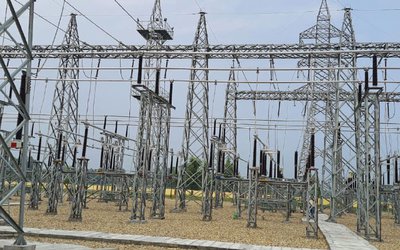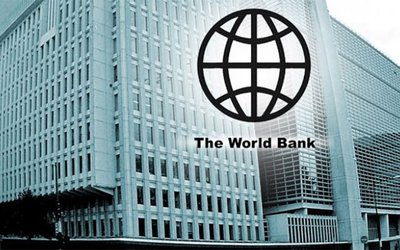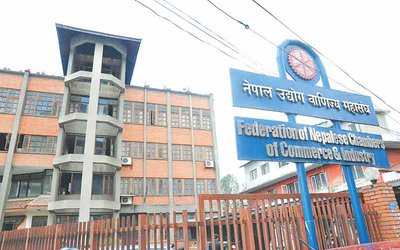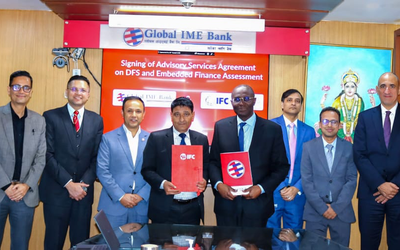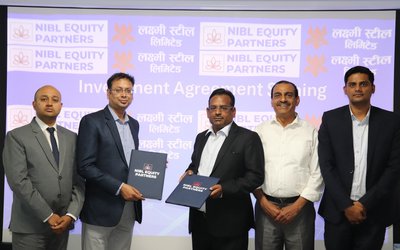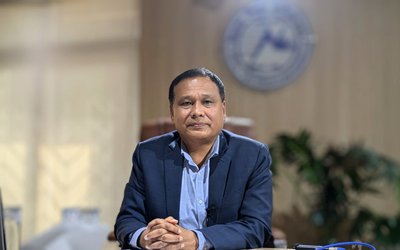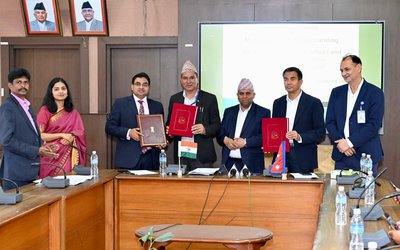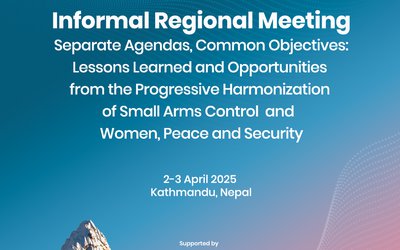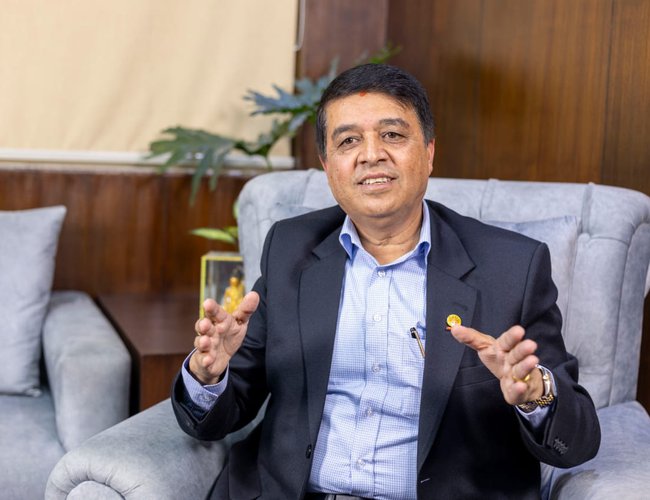
As founder of Apple Inc. Steve Jobs once said, the person who want to change, he does not need life time but can bring the reform and change given time for his or her role. This has been proved by Chandra Prasad Dhakal, President of FNCCI.
For many, one and half year is too short to complete the remarkable work. This is not the case with President Dhakal who has made all his efforts and dedication to spare each of his valuable time for advocacy for investment promotion and policy reform.
From the first day of his office, President Dhakal has faced the most challenging movement. The day after the new Executive Committee took charge, news came that the National Assembly had passed a law to bring the private sector under the scope of investigation for abuse of authority.
This was an incident that was approved by the upper house of parliament under the provisions that would have far-reaching impact on the private sector and could affect the investment itself. The leadership of the Federation immediately discussed the matter with the then Chief Whip of the largest party in Parliament, Ramesh Ukhar. Immediately, the Congress Parliamentary Party held a discussion at the Parliament Secretariat and called the leading private sector organizations.
There, the private sector, including Chairman Dhakal, tried to remind why the authority should not enter the private sector. After that, there were repeated discussions with Nepali Congress Chairman Sher Wahadur Deuba, CPN UML Chairman and Prime Minister KP Sharma Oli, and then Prime Minister and Maoist Chairman Pushpa Kamal Dahal Prachanda. The bill went to the State System Committee of the House of Representatives and discussion began.
The Federation felt the need to educate everyone on why the private sector was important. In collaboration with the International Finance Corporation under the World Bank Group, a study report called State of Private Sector was published in May 2080.
It showed for the first time the contribution of the private sector to the economy. According to it, it contributed 81 percent to the economy and 86 percent to employment. It was also found that many people use it as a reference material.
To take this issue to its logical conclusion, on 2 Bhadra 2081, the Federation organized an interaction with members of the Federal Parliament on policy reforms for sustainable economic development.
In addition to the Abuse of Authority Investigation Commission Bill, more than 12 bills related to the private sector such as power, national dignity, customs, school education, etc. were discussed in the Parliament. About 175 MPs from both parliaments were present.
On Bhadra 4, 2081, the Federation submitted a written letter to the State Law Committee to remove the provision in the Law on the Commission for Investigation of Abuse of Authority and the Prevention of Corruption that the private sector should also be investigated by the authority.
Now the political parties have agreed to stop the authority's entry into the private sector. The controversial issue for next year is dedicated and trunk lines. The dispute from almost five years ago flared up again in Bhadra 2080.
After the Electricity Authority asked the industries to cut the power lines over a controversial issue, the then Prime Minister Pushpa Kamal Dahal, in front of the team led by Federation President Dhakal, ordered the Managing Director of the Authority, Kulman Ghisingh, to cut the lines.
Although the dispute seemed to be resolved for three months, the Pushma Authority immediately cut the line. Pros and cons were discussed. If the affected industry remained in opposition, the authority continued to insist on collecting the arrears anyway.
As a result, the Federation submitted a proposal to the government to form a high-level commission to find a sustainable solution to the dispute, and issued a statement on the issue on the 9th of Pusha, 2080. The request of the Federation was that the Commission should work to pay the Will based on the evidence.
Immediately after that, a commission was formed under the chairmanship of former Supreme Court Judge Girish Chandra Lal on 24th Pushh 2080. And the commission also submitted the report. Even after that, there were many debates and discussions whether to implement the report of the commission or not.
But finally, on the 26th of Kartik 2081, the government decided to implement the report of the commission. This issue is now solution oriented. Another challenge was to improve the investment environment, which has been disturbed for the past three years under the leadership of the Congress government and continues to be disturbed.
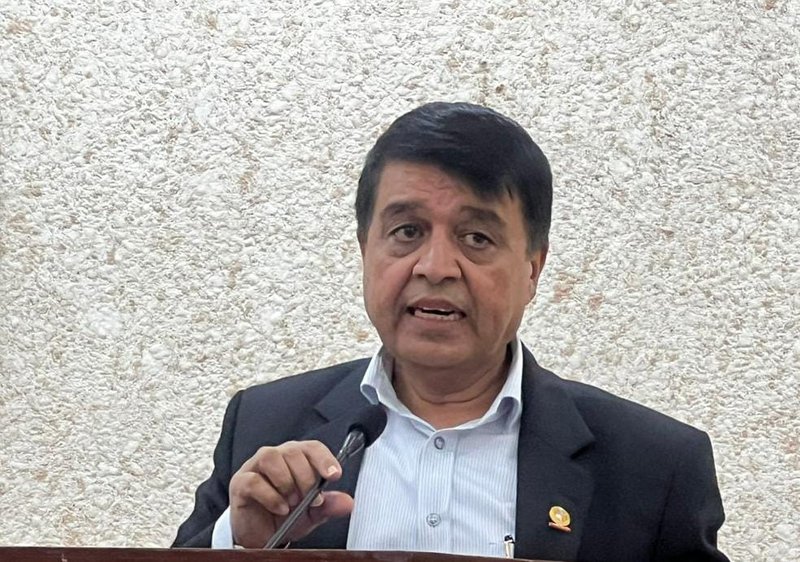
The accumulation of some $7 billion of investable funds in banks is evidence that domestic investors do not want to invest, while foreign investment has declined by 60 percent compared to three years ago to some $6-9 billion.
That is zero decimal 2 percent of gross domestic product. Cambodia, which became a member of the World Trade Organization along with Nepal, has 12 and a half percent of foreign investment of gross domestic product while it is higher than 4 percent in the least developed countries like Rwanda, Ethiopia and Bangladesh.
The executive committee meeting held in Dhorpatan of the Federation decided to establish an investment company on the initiative of the Federation and channel the small investments from all over the country to various sectors.
The company was not managed by the Federation, but it was initially promoted and had a separate board of directors and it was promoted so that all members and non-members of the Federation were also investors. Another objective of the company, which has a capital of up to 10 billion rupees, is to encourage the private sector to invest and to convey the message that large projects can be implemented by mobilizing local capital.
In addition, 4 major investment conferences were organized outside the country during this period to promote Nepal abroad. The Nepal-China Business Summit was organized twice in China.
Prime Minister KP Sharma Oli was the chief guest at the summit held in September 2023 and then Prime Minister KP Sharma Oli was the chief guest on December 4, 2024.
China's Vice Minister of Commerce Liang Jie was the special guest in both the programs and about one and a half hundred Chinese entrepreneurs and businessmen attended the programs. The Federation organized the conference in collaboration with the Chinese partner organization CCPIT.
The Nepal-India Summit was held in New Delhi on June 18, 2080. India's Minister of Commerce and Industry Piyush Goyal was the special guest at the summit where then Prime Minister Dahal was the chief guest.
Then Nepal Dubai Business Forum was organized in Dubai on 14th of Mansir 2080. A successful program was held in co-organization with Dubai Chambers which is very influential in the world.
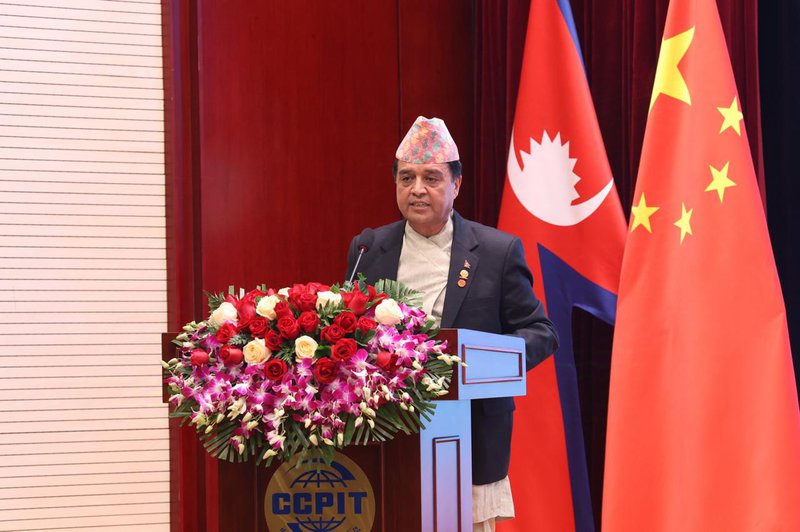
About 170 industrialists participated in the event which was attended by the then Prime Minister of Nepal, Dahal. On the 20th and 21st of Kartik 2080, the conference of Asia Pacific Regional Chamber of Commerce and Industry (CACI) was organized in Nepal.
After Cambodia expressed its inability to organize the conference, the conference held in Nepal was attended by about 200 businessmen, including about 60 foreigners. For the first time, a conference for women entrepreneurs was held outside the capital in Bhairahawa.
In the presence of King Amir Sheikh Tamim bin Hamad Al Thani of Qatar and the then Prime Minister of Nepal Dahal, an agreement between the Federation and Qatar Chamber was signed in Kathmandu on 12 Baisakh 2081 for the establishment of Nepal-Qatar Joint Commercial Council comprising the private sectors of Nepal and Qatar.
Subsequently, the presidential meeting was held in Doha. It was agreed to establish the BIMSTEC Chamber of Commerce at the BIMSTEC Business Summit 2024 to be held in New Delhi, India on August 6-7, 2024. His proposal was made by President Dhakal at a similar conference held in Kolkata in June 2023.
After continuous participation in the international investment conferences of the Federation, the draft of the bilateral investment agreement was approved by the Council of Ministers after continuous demands in the relevant bodies regarding the need for bilateral investment agreements with potential investment countries.
Discussions to reach an agreement with some countries have progressed. The Federation is facilitating them. At the third investment conference held on the 16th and 17th of Baisakh, 2081, the laws that hindered investment were reformed at the request of the private sector.
This is the beginning of the reform. Meanwhile, the Federation has realized that it is necessary to move forward with the New Phase Reform Plan for structural reforms. On Asoj 25, 2080, the federation held a large-scale economic discussion program and demanded that a new phase of economic reform should be implemented along with the current capital loan guidelines and other reforms, and for this, the federation demanded the formation of a high-level commission.
Meanwhile, some of the demands were addressed in the third quarter review of last year's monetary policy. There were some changes in the current capital loan guidelines. Although it was a little relief, not all entrepreneurs could feel the complete relief.
The monetary policy of the current fiscal year included some other points. But they were not enough for improvement. We were the first to call for the formation of a high-level commission involving the private sector for the new phase of reforms.
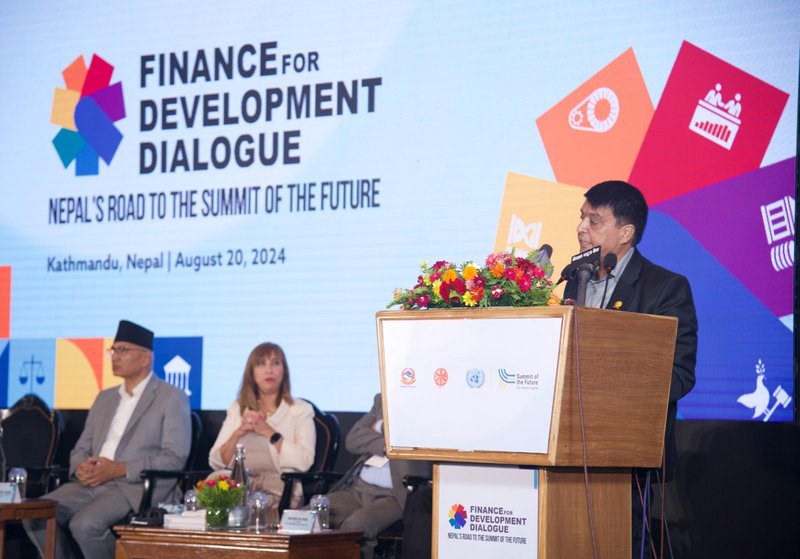
This issue was also included in the 100-day program of the new finance minister. In the 100-day program speech of the honorable Prime Minister, it is clearly mentioned that the commission was formed according to the demand of the private sector.
Subsequently, a committee was formed under the chairmanship of former finance secretary Rameshwar Khanal with the participation of President Dhakal and presidents of other organizations. Now the additional responsibility of reform has fallen on me," says President Dhakal, "we are constantly trying and will continue to do so.
Meanwhile, a special initiative has been taken to reform the secretariat to effectively manage the activities of the federation. Business intelligence system software has been installed for research and development to provide evidence-based recommendations.
A Memorandum of Understanding was signed with Nepal Rasht Bank. With the help of this bank, Nepal International Economic Conference will be organized in the first week of February.
Accounting management has been made online under the daily operations of the Federation. As a result of effective reforms especially in accounting and other activities, the certificate of tax exemption, which was withheld for about eight years, has been obtained. This has made it easier for members to obtain tax exemption certificates.
Software for the management of certificates of origin is being developed. A committee has been formed under the coordination of Surkrishna Vaidya, Vice President of District Municipal Industry for coordination and further improvement in this regard.
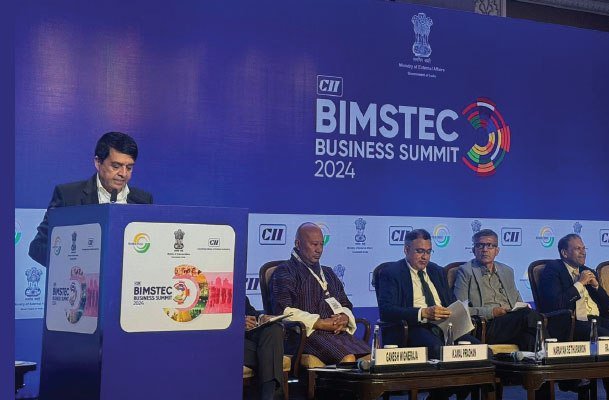
It is necessary to link all the District, Municipal, Industrial and Trade Associations issuing certificates to the mandatory online system. The Federation believes that this will make the process of issuing certificates more transparent. In cooperation with GIZ, revenue-related training was organized in 20 locations during this period. It is organizing capital market-related training in cooperation with the Securities Board.
The Federation has also started providing financial assistance of one lakh rupees to the District Town Trade Associations organizing fairs to help in market promotion. The Federation has also given importance to Corporate Social Responsibility.
About two million rupees were provided for the earthquake relief in Jajarkot and Rukum West. The Federation also supported the earthquake relief in Turkey.
The Federation has decided to provide one lakh rupees for the flood affected districts in October. The Federation provided five lakh rupees to encourage Palesha Gowdradhan, who won a silver medal in the Paralympics.
- A Novel AI-Based Method Reveals How Cells Respond To Drug Treatments
- Apr 03, 2025
- IWMMI: Water Resilience Tracker
- Apr 02, 2025
- Nepal-India Signed Memorandum of Understanding (MoU) For 10 Projects
- Apr 02, 2025
- UNRCPD To Host Confernce On Small Arms
- Apr 02, 2025
- Weather Forecast: Partly Cloudy In Kathmandu And Pokhara
- Apr 02, 2025
